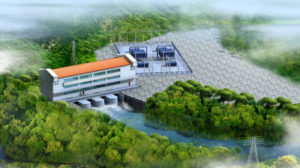
Guyana remains the only South American member state without an operational hydro-electric plant despite it possessing the greatest potential for this renewable energy source. The high cost of energy remains a challenge to Guyana’s development, hence it is poised to meet its demand for cheap, reliable energy and also provide the same to other countries, thus adding to revenue streams to the nation’s coffers.
The pre-feasibility study will commence in early April, executed over a 12-month period, after which the feasibility study will commence. The cost of US$45 million will be borne by the Consortium Quieroz Galvao, comprising two Brazilian engineering companies. The consortium’s focus is to develop a hydropower station in the Upper Mazaruni with a capacity of about 3,000 megawatts and another in the Middle Mazaruni with a capacity of 1,500 megawatts.
Prime Minister Samuel Hinds said at a press conference Monday that the government has already started ‘briefings’ with the political parties, private sector officials and the National Toshaos Council on the issue, while consultations commenced in the surrounding Region Eight communities.
According to Hinds, during consultations with residents in the Upper Mazaruni, fears were expressed about the complete flooding of the area. According to the prime minister, although this was predicted in the 1970s design of the project, technology has since advanced to the point where this fear would be groundless.
“We informed them that with the advancement of technology there is a totally different approach with the design which would reduce the reservoir area significantly in the vicinity of 90 percent or more in comparison to the 1970s design. This has been confirmed by a preliminary review done by the consortium,” Hinds added.
It was further explained that the Guyana government will not pursue the project if it will affect the lives of residents in the area.
“We assured the communities that this government will not pursue the construction of any hydropower station if it required extensive flooding of villages, which would have been the case in the 1970s. We explained that the studies need to be done now so that we can move to the next stage,” Hinds said.
Minister of Foreign Affairs Carolyn Rodrigues-Birkett meanwhile explained that the consortium will be responsible for securing funding for the hydropower project, and the royalties will be paid to Guyana, hence there will be no financial risk to the country.
The minister is optimistic that Brazil, which needs and will need more energy sources to maintain its economic growth, will purchase electricity from the project and Guyana will benefit from royalties.
She explained that six agreements have been signed between Guyana and Brazil, dating back to 1982. The most recent agreements resulted in a memorandum of understanding to establish a working group on infrastructure projects, signed in December 2012. The mandate of this group was the construction of hydro-electric plants, along with transmission lines, and access roads, the improvement of the Guyana-Brazil road (Lethem to Georgetown) link, and the construction of a deep-water port.
Read the full story at caribbeannewsnow.com


